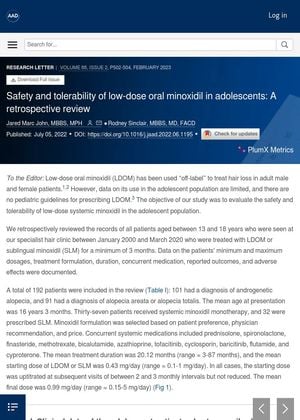TLDR The safety and tolerability of low-dose oral minoxidil for treating hair loss in adolescents is not clearly determined.
This retrospective review evaluated the safety and tolerability of low-dose oral minoxidil (LDOM) in 192 adolescents aged 13-18 years treated for hair loss at a specialist clinic between January 2000 and March 2020. The study included patients with androgenetic alopecia (101) and alopecia areata or alopecia totalis (91). The mean treatment duration was 20.12 months, with a mean starting dose of 0.43 mg/day and a mean final dose of 0.99 mg/day. Adverse events were reported in 65 patients (34%), with hypertrichosis being the most common (22 cases). Other mild adverse events included postural hypotension, nausea, headaches, and palpitations/tachycardia. No serious adverse events were noted, and there were no significant differences in adverse event frequency between LDOM and sublingual minoxidil (SLM). The study concluded that LDOM and SLM have an acceptable safety and tolerability profile in adolescents, though larger placebo-controlled trials are needed to establish optimal dosing and safety in this population.
 39 citations
,
February 2021 in “Journal of The American Academy of Dermatology”
39 citations
,
February 2021 in “Journal of The American Academy of Dermatology” Low-dose oral minoxidil safely treats hair loss, with hypertrichosis as main side effect.
 12 citations
,
July 2020 in “Dermatologic Therapy”
12 citations
,
July 2020 in “Dermatologic Therapy” Minoxidil, applied on the skin or taken orally, can improve hair growth in kids, but more research is needed due to possible side effects.
 59 citations
,
July 2020 in “Journal of The American Academy of Dermatology”
59 citations
,
July 2020 in “Journal of The American Academy of Dermatology” Oral minoxidil promotes hair growth but may cause side effects; needs monitoring.
 19 citations
,
June 2020 in “International Journal of Dermatology”
19 citations
,
June 2020 in “International Journal of Dermatology” Low-dose oral minoxidil effectively treats non-scarring hair loss with some side effects like hypertrichosis and postural hypotension.
 16 citations
,
May 2020 in “Journal of The European Academy of Dermatology and Venereology”
16 citations
,
May 2020 in “Journal of The European Academy of Dermatology and Venereology” Sublingual minoxidil effectively treats hair loss with mild side effects.
 August 2023 in “Journal of Cosmetic Dermatology”
August 2023 in “Journal of Cosmetic Dermatology” Some plants like spinach, broccoli, and matcha may boost the effectiveness of the hair growth drug minoxidil.
 8 citations
,
April 2019 in “Dermatologic Therapy”
8 citations
,
April 2019 in “Dermatologic Therapy” Tretinoin boosts minoxidil's effect on hair loss by increasing enzyme activity.
5 citations
,
January 2018 in “Italian journal of dermatology and venereology” Minoxidil effectively stimulates hair growth in androgenetic alopecia.
 14 citations
,
January 2015 in “Skin appendage disorders”
14 citations
,
January 2015 in “Skin appendage disorders” Minoxidil treatment for hair loss can cause scalp allergy and severe hair loss.
 269 citations
,
August 2002 in “Journal of The American Academy of Dermatology”
269 citations
,
August 2002 in “Journal of The American Academy of Dermatology” 5% minoxidil works better for hair growth and density, with minor irritation.
 39 citations
,
March 1987 in “Journal of The American Academy of Dermatology”
39 citations
,
March 1987 in “Journal of The American Academy of Dermatology” Topical minoxidil is a safe and effective treatment for hair loss caused by androgenetic alopecia.











